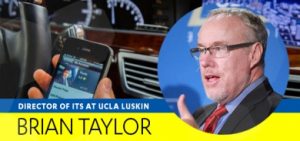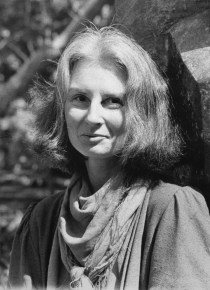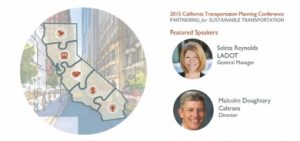New Report Calls for More Consistent Policies for Mobile App Transportation and Taxi Services

WASHINGTON – Innovative transportation services such as car sharing, bike sharing, and transportation network companies (TNCs) like Uber and Lyft are changing mobility for millions of people, yet regulation of these services often varies greatly across geographic areas and industry segments. Policymakers and regulators should formulate consistent policies that encourage competition among new and traditional transportation services — such as taxis and limousines — in order to improve mobility, safety, and sustainability, says a new report from the National Academies of Sciences, Engineering, and Medicine.
California was the first state to establish statewide regulations for transportation network companies and as such UC researchers played a large role in the report. The report was authored by a diverse group of academics and practitioners, including Brian Taylor, director of the UCLA Institute of Transportation Studies at the Luskin School of Public Affairs. Taylor served as chair of the committee. Other notable members of the committee include Michael Manville, Cornell University and Jennifer Dill, Portland State University, both of whom are alumni of the UCLA Luskin School of Public Affairs.
The availability of on-demand transportation services through smartphone apps is increasing shared mobility. The growth in these services follows and amplifies a recent rebound in taxi and public transit use. As of June 2015, Uber provided more than 1 million rides daily worldwide, while Lyft operated in 60 U.S. cities with more than 100,000 drivers.
The rapidly expanding services provided by TNCs, however, raise policy and regulatory challenges with regard to passenger and driver security, public safety, insurance requirements, employment and labor issues, and accessibility and equity. Current regulation of taxis and other for-hire transportation varies considerably across and within jurisdictions, even when the services offered are similar. Most large cities with sizeable street-hail markets extensively regulate taxis, while smaller cities where dispatch service is the norm tend to have lighter regulation. This pattern raises public policy concerns when taxi regulation is more stringent than that of TNCs. Leveling the regulatory playing field requires a reassessment of existing regulations governing taxi, limousine, and TNC services to determine the minimum necessary to ensure quality service and allow effective competition.
“Smartphone applications and GPS data are making feasible transportation services that have never before been realized on a large scale, and these services have the potential to increase mobility while reducing congestion and emissions from surface transportation if regulated wisely to encourage concurrent ride sharing,” said Taylor, who is also a professor of urban planning at the Luskin School of Public Affairs. “A key hurdle for policymakers at all levels of government is to both promote and facilitate innovations that meet the public’s mobility needs while achieving greater policy consistency among these new services and between them and traditional taxi and limousine services.”
To address public safety concerns, regulations currently focus on background checks of drivers, vehicle inspections, and minimum standards for vehicle liability insurance. Procedures for driver background checks are based on common practice but their efficacy has not been rigorously evaluated; likewise, the safety benefits of viewing shared driver ratings and operator and vehicle images on mobile apps have not yet been well-documented. Therefore, regulators at the state and federal levels should evaluate these safety requirements for their effectiveness and cost, the report says.
Regulated taxis offer critical transportation for people with disabilities in many areas, and although TNCs have introduced pilot programs to provide such services, they do not currently provide wheelchair-accessible services on an extensive or reliable basis, the report says. About 10 percent of the U.S. population has a physical limitation; 3.6 million people use a wheelchair and another 11.6 million use a cane, crutches, or a walker. A decline in taxi fleets due to the continued rapid rise in TNCs could decrease the availability of for-hire vehicles for a substantial number of these travelers unless the quantity of TNC services for those with disabilities expands.
Further, most shared mobility services require users to have a credit card on file with the provider and arrange the trip using a smartphone. However, roughly 8 percent of U.S. households lack bank accounts that allow them to have credit cards, and 50 percent of adults earning less than $30,000 and 73 percent of adults over age 65 do not own smartphones. The committee concluded that local officials should ensure that the mobility needs of low-income, older and disabled riders are met as these new services expand and evolve.
In addition, policymakers and regulators should examine the pros and cons of alternative employment classifications of both TNC and taxi drivers. While new mobility services offer expanded opportunities for flexible, part-time employment for students or those seeking transitional income between careers, TNC drivers and most taxi drivers are classified by their companies as independent contractors, which limits their access to benefits tied to employment. This lack of benefits raises policy issues concerning employer-provided health care, workers’ compensation for injuries, and vacation and sick leave for those for whom such work is their sole source of income.
Policymakers and regulators should also consider whether traditional for-hire and shared mobility services are best monitored and regulated at the state, regional, or local level on the basis of market and service characteristics and regulatory capabilities. In addition, transportation planning bodies should develop methods for incorporating shared mobility into transportation planning initiatives and promote collaboration between public- and private-sector transportation providers.
Other UC researchers contributing to the report were Susan Shaheen of UC Berkeley and Daniel Sperling of UC Davis. Sperling is chair of the Transportation Research Board (TRB), which initiated and funded the study.
The study was sponsored by the TRB, a program of the National Academies of Sciences, Engineering, and Medicine. The Academies are private, nonprofit institutions that provide independent, objective analysis and advice to the nation to solve complex problems and inform public policy decisions related to science, technology, and medicine. They operate under an 1863 congressional charter to the National Academy of Sciences, signed by President Lincoln. For more information, visit www.nationalacademies.org.



